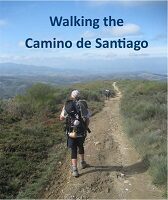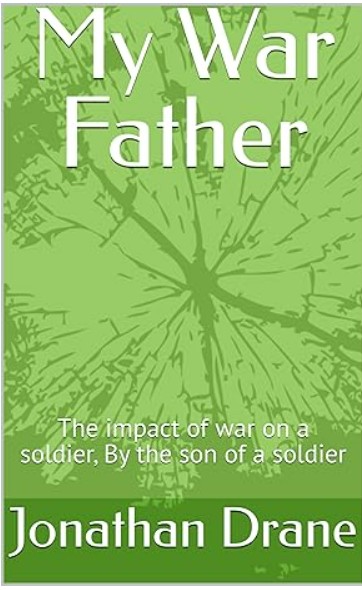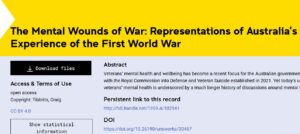My War Father- a memoir by the son of a soldier- A Lived Account of War’s Intergenerational Impact and the Introduction of the Soldier Citizen Research Project. Soon to be released at the Open Door Symposium, Flinder’s University, Adelaide on 17th November 2025. Dr Jon Drane will be presenting the memoir at the Symposium.
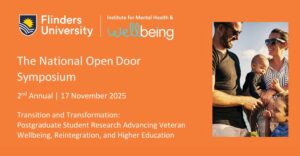
Register Here: ( In person or online): https://qualtrics.flinders.edu.au/jfe/form/SV_8hUmHRru25OZKjs?Q_CHL=qr
Presentation by Dr Jonathan Drane at 2025 Open Door Symposium, Flinders University
I am honoured to be included in the speaker line up at the upcoming Open Door Symposium to be held at Flinder’s University in Adelaide on the 17 th November. I will be presenting My War Father at the Symposium.
My usual research path is related to the growth and malaise of cities!. So this is right on a different slant. But at age 70 it is important to me to remember my father’s contribution to Australia in WWII and then to raising a family in suburban Sydney in the 1950s.
Thanks to the Open Door team including Ben Wadham, Andrew Prevett and Kieran Toohey with this incredible initiative that helps us understand military culture and its impact on its service people and their families.
 Dr Jonathan Drane, Optimum Search Lead and Founder of The Soldier Citizen Project
Dr Jonathan Drane, Optimum Search Lead and Founder of The Soldier Citizen Project
Register Here: ( In person or online): https://qualtrics.flinders.edu.au/jfe/form/SV_8hUmHRru25OZKjs?Q_CHL=qr
Access My War Father Here (released 17th November 2025) Queries?: send email to Jon at jondrane55@gmail.com
Summary: My War Father by Jonathan Drane
This memoir explores the `enduring impact of war on veterans and their families, drawing on the author’s experiences as the child of a WWII veteran who served in Kokoda and Tobruk. Using his father’s memoir and historical records, the paper examines the long-term, often intergenerational consequences of wartime service.
It also introduces the Soldier Citizen Research project, a new initiative dedicated to furthering understanding of the impact of war on soldiers and their families, a critical issue highlighted by recent inquiries into veteran suicide.
This short story book offers a profound, personal exploration into the enduring impact of war on veterans and their families, using the author’s own experience as the child of a WWII veteran as a case study. The narrative is built upon the lived experiences of a father who faced the grim realities of battle in locations like Kokoda and Tobruk from 1939 to 1945, and the consequent effects that lingered over decades, echoed across generations.
The author, turning 70, draws from his father’s memoir, ‘My War Path,’ written in his 70s, to shed light on the often-overlooked, time-worn impacts of war on soldiers and their families. This personal account is interwoven with historical records, thus providing a deep, multi-faceted perspective on the long-term consequences of war.
Furthermore, the paper introduces the recently established Soldier Citizen Research project. This initiative is dedicated to studying the impact of war on soldiers and their families, an area underscored by the recent Royal Commission into Defense and Veteran Suicide. By combining personal narrative with academic research, this paper aims to contribute to a more profound understanding of war’s lasting effects on those who serve and their families.
Book References:
Clare, R. (2016). Enemy. Penguin Books.
Drane, J. (2025). My War Father. https://jondrane.net
Drane, J. R. (1994). My War Path: The story of one man’s struggle in WWII. An autobiography [Unpublished manuscript]. Private Publication not for general publication. Research enquiries contact Jon Drane jondrane55@gmail.com
Tibbitts, C. (2023). The Mental Wounds of War: Representations of Australia’s Experience of the First World War [Doctoral dissertation, University of New South Wales Canberra].
Van der Kolk, B. A. (2014). The body keeps the score: Brain, mind, and body in the healing of trauma. Penguin Books.
Wadham, B., & Connor, J. (n.d.). Warrior, soldier, brigand: Military institutional abuse and organisational reform in the Australian Defence Force. Flinders University.
Bibliography
Refer:
The Soldier Citizen: https://www.jondrane.net/the-soldier-citizen/
My War Father Paper-Short Story Access My War Path Here (to be released 17th November 2025) queries?: send email to Jon at jondrane55@gmail.com
Book Reviews:
As I navigated the complex topic of my father’s war journey over 6 years in WWII, I was helped greatly by many authors who covered the impact of war. Two in particular helped greatly. One a historical piece by Craig Tibbitts on Mental Wounds of War (2023) and another on military culture and its vagaries to its own people. The latter is called Warrior, Soldier Brigand and it is by Ben Wadham and James Connor.
I wanted to pay tribut to these and many other works I read in the horror bibliography of the Royal Commission. I hope that things will change due to these works. Here are my reviews of each book.
Dr Jonathan Drane
The Mental Wounds of War Craig Tibbitts, (2023).
Access Paper: https://unsworks.unsw.edu.au/entities/publication/6ec39807-54d4-4661-be14-1f724a652170
Abstract
Jon Drane’s Review of ‘Mental Wounds of War’
Craig’s amazing historical review of the mental wounds of war (in the early 20th century) really inspired me to continue with understanding my own father’s memoir of WWII (My War Path) but also to help create my own memoir (My War Father).
The concept of ‘Shell Shock’ is covered in Craig’s book with the prevailing notion that it was a class based phenomena. Meaning the upper class people as an example, had better ‘breeding’ and were not as likely to suffer from Shell Shock.
He notes ‘ representations of mental war wounds have been influenced by the cultural, educational and professional background of those producing them’.
This had strong relevance to my father’s journey when he was bombed and buried alive at Tobruk and recovered, but denied the label of shell shock. Instead preferring to label other soldiers as suffering from this ‘label’ of the time. My father was from a middle class with his father being a land surveyor.
Thanks Craig Tibbits for this amazing contribution to understanding the impact of war on service people and their families.
Dr Jonathan Drane
Warrior, soldier, brigand: Military institutional abuse and organisational reform in the Australian Defence Force.
By Ben Wadham and James Connor.
Abstract
Please be advised that the contents of Warrior, Soldier, Brigand depict first person accounts of institutional abuse that readers may find distressing.
Questions of institutional abuse have been at the centre of numerous royal commissions, inquiries and reviews of the clergy, the police and defence forces over the past decade. This scrutiny has highlighted how those organisations foster forms of violence and violation. One of their principal characteristics is that the culture of abuse and its perpetration is largely the work of men. In Warrior Soldier Brigand, Ben Wadham and James Connor argue that three pillars shape the patterns of abuse in the Australian Defence Force: martial masculinities, military exceptionalism and fraternity.
Jon Drane’s Review of ‘Warrior Soldier Brigand’.
Warrior, Soldier, Brigand is a challenging journey into the vagaries and darker side of military culture and its mechanations. Behaviours are categorised into three types (Warrior Soldier Brigand) with varying degrees of moral direction from the noble to the evil as quoted:
Warrior: ‘The warrior embodies the qualities of courage, strength, and skill in the context of conflict or combat.They are trained and skilled in the art of warfare. Warriors live by a code of ethics and possess a strong sense of honour, discipline, and loyalty to their cause or community’.
Soldier: ‘The soldier is a member of a professional military organisation who is trained and equipped to engagein arfare. Soldiers serve under a structured chain of command and follow orders to carry out missions and protect their nation’s interests’.
Brigand: ‘We use the term brigand to describe the rogue and lawless character of some members of the professional military. The brigand engages in acts of banditry or lawlessness, often resorting to robberyt theft or violence. Unlike warriors or soldiers, brigands do not operate within a recognized military or legal framework, or for our purposes they put self-gratification and group codes above and beyond the collective good’.
The book elucidates the impact of these cultures which in some situations manifests in violence, initiation, rape, sexual assault, moral injury and bullying.
The case studies are horrifying and the research team and interviewees should be congratulated on what must have been a grueling process of truth and revelation.
The book follows both authors’ incredible contribution to the The Royal Commission into Defense and Veteran Suicide.
Of particular relevance to our research into impact of war on families is the paper ‘Mapping Service and Transition to Self-Harm and Suicidality | Royal Commission into Defence and Veteran Suicide’ by Flinders University for the Royal Commission Professor Ben Wadham Associate Professor James Connor Dr Kellie Toole Professor Emma Thomas.
Access Link: https://defenceveteransuicide.royalcommission.gov.au/publications/exhibit-f-01061-dvs001100011192-mapping-service-and-transition-self-harm-and-suicidality-royal-commission-defence-and-veteran-suicide-research-paper
Amazing work Ben Wadham and James Connor and the Open Door team.
Dr Jonathan Drane
A War Poem: And the Whip Bird Sang By Jonathan Drane
As I was creating My War Father I took a break and was sitting with my wife at Merrewether Ocean Pool in Newcastle when a whipbird sang!
I am used to hearing whipbirds in the forests of the hinterland not on the ocean. Being a part time poet I started to brew a poem , a war poem that honoured my father’s battalion over 6 years of service in three primary terrains: Desert; Tobruk, Jungle; Kokoda and Islands; (Pacific Islands- Borneo). It honours the timelessness of our native species that also personify Australia as a continent.
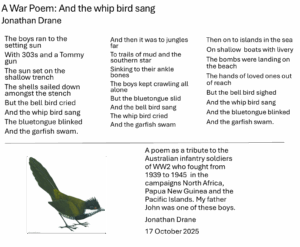
Image source: Encyclopedia Brittanica, Inc 2010
The Soldier Citizen Study- Discover The Impact of War on Soldiers & their Families.
Explore “The Soldier Citizen” AI research project and understand the impact of war on soldiers and their families- a groundbreaking research project led by Dr. Jonathan Drane, shedding light on the profound effects of war on soldiers and their families.
Focusing on mental health, suicide, and domestic violence, this insightful study delves into the soldier’s journey from citizen to combatant and their challenging transition back to civilian life. Engage with this compelling research to gain a deeper understanding of the silent battles soldiers and their families face and contribute to potential solutions for their reintegration into society.
Focus: Soldier Journey- A cultural framework
The research seeks to provide a cultural understanding of the soldier’s journey back into citizen society by charting their pathway through original citizenship, recruitment, military training, combat experience/interface and then integration back into citizen society and family.

Learn More:
The Soldier Citizen Study- Discover The Impact of War on Soldiers & their Families
The Soldier Citizen is copyright Jonathan Drane © 2025 all rights reserved.

